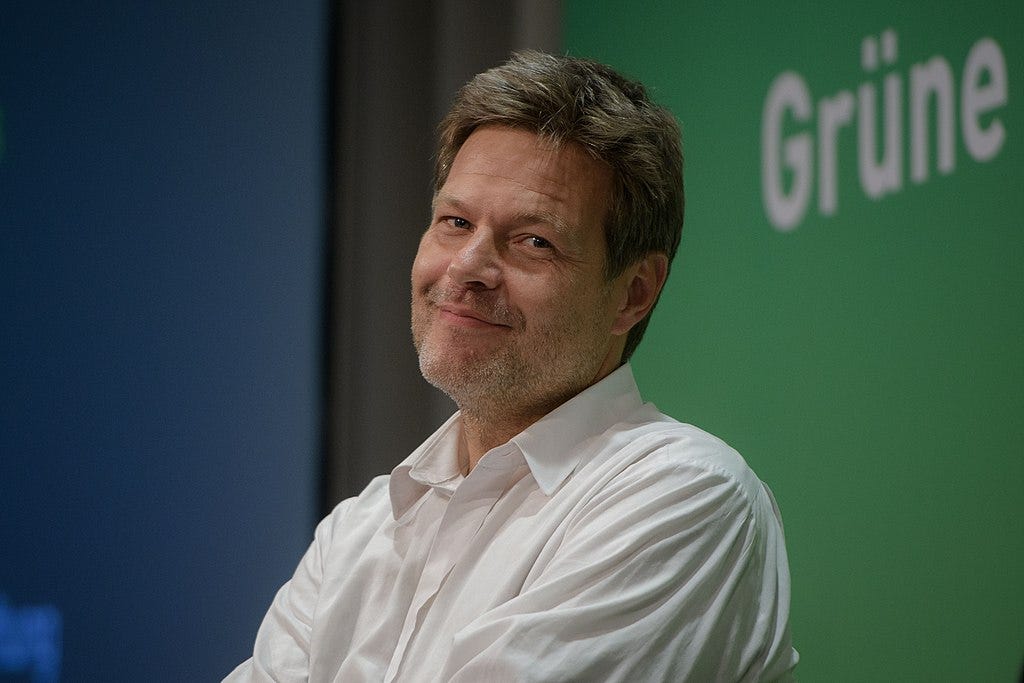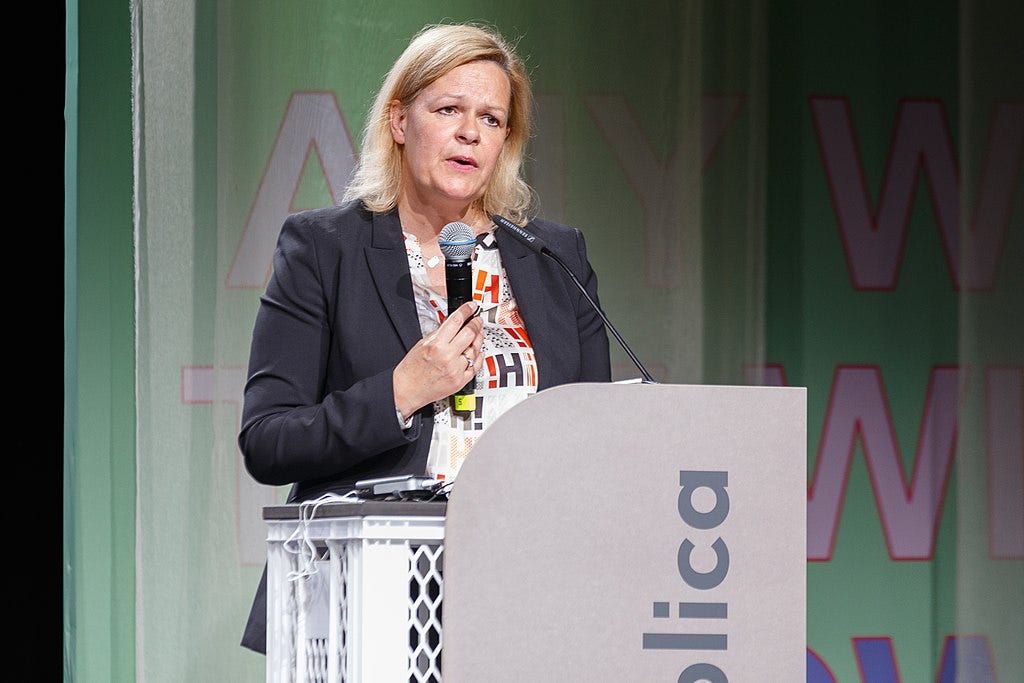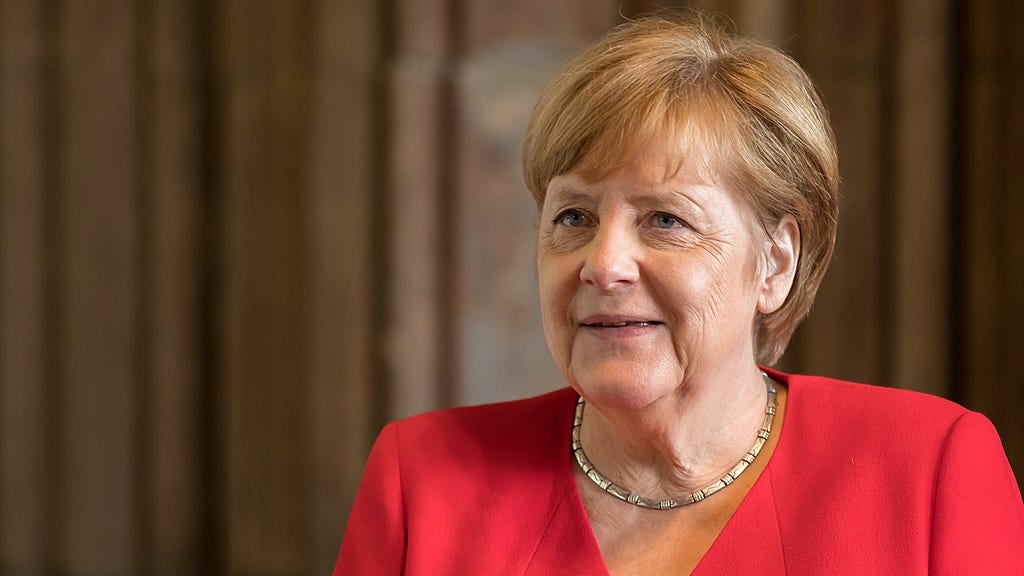Autumn Storm in German Politics
The AfD's success in German elections: people showed their discontent with the political elite.
Although Germany's mainstream parties are having to lick their wounds following the recent state elections, the success of the opposition party Alternative for Germany (Alternative für Deutschland, AfD) has not yet led them to change their economic and immigration policies to meet the wishes of their electorate. On the contrary, a group of MPs from both the coalition and the opposition want to initiate a bill to ban the AfD and started collecting signatures for this.
Elections for the Landtag – the local parliament of a German state – of the three former East German Länder have now passed. After the European Parliament elections, it was clear what was coming – AfD victory. The turnout was significantly higher than at any time since the end of the communist East Germany, the German Democratic Republic (Deutsche Demokratische Republik, DDR), with over 70% in all three Länder. What the election results showed is therefore clearly the view of the citizens of these Länder.
For the governing coalition in Germany, these results were highly disappointing. The coalition of the Greens, the Social Democrats (SPD) and the Free Democrats (FDP) was already threatened with disintegration before the general elections next September. No one doubts that the 2025 elections will be won by the CDU/CSU, the Christian Democrats, a traditionally broad-based conservative party. A party that played down all its former values during Angela Merkel's long reign, under Mrs Merkel's firm leadership, and is now trying to rediscover them. Refraining at the same time from upsetting its members who have gone green, red and globalist in the intervening period.
In the chaos created by the traffic light coalition
The current government, which in Germany is called the traffic light coalition – the Greens, the Social Democrats as reds and the FDP, the Free Democrats, which are usually identified by the colour yellow – is leaving behind a legacy of chaos. The Greens, with children's book author Robert Habeck in charge of the ministry of economy and climate, are the ones most responsible for this. In pursuit of his lofty green goals, Habeck has driven the German economy down the hill, while inflation is up. If you want to know more, click here.
Deterioration of living standards, rising prices, and (heating) rules that are incomprehensible to the public, which Habeck's climate ministry has made mandatory for all (and changed some again), are all important reasons for public discontent.

The second cause, probably the first in terms of its painfulness, is migration – i.e. immigration. This, too, is the favourite topic for the Greens, who to this day are not willing to take a step back on these issues and live in a fairy tale of a world where all people are brothers and wish each other well, where nationality is irrelevant, etc. And if we consider that the fairy tales written by the Brothers Grimm were not intended for children in their original form, as they were brutally bloody stories, then it would indeed be fair to call the global plan for resettlement a fairy tale. Even in the United States, which we know as a country of immigrants, the uncontrolled flow of strangers across the border has exceeded the tolerance of the Germans.
In Europe, countries have grown based on nationalities. In some countries, they have grown based on several nationalities, by an agreement between them – as in Switzerland. Where, then, other values unite people.
Germany itself is not a best example of a nation state either - it was only in 1871 that the various principalities were united into a single German state. What naturally brought it together was the common language.
In today's Germany, it is forbidden to call the country a nation state. Doing so may lead to punishment but in the least to resentment. Many millions of immigrants, including those who crossed the border yesterday, might feel hurt – although hardly anyone has asked them. It's the most progressive Germans themselves who have decided so.
Mass immigration: immigrant quotas in public offices, crime and billions in costs
In order to cement Germany as a multi-ethnic immigration state, the current government's Interior Minister Nancy Faeser has submitted a draft bill that would set a quota for immigrants and others who have "felt discriminated against" in state offices, all the way up to the Federal Constitutional Court in Karlsruhe. If it becomes law, people of German origin will have to be kept out of the running for new open positions for some time until the progressive quota is met.
On the other hand, at the level of ordinary people, they are probably less bothered by a constitutional court made up of Afghans than by the upsurge of asylum centres in hitherto cosy small towns, where the number of asylum seekers may at times exceed that of the local population. As time has shown, asylum seekers bring problems. They are mostly young men who have dared to embark on the difficult long journey. For whom relatives have put up the big bucks that today's slave traders charge for a full package to Europe. Young men want sex. Even if they don't come from societies where sex is agreed upon between men and women on a different basis than in Europe, here, they have no prospect of getting sex by agreement. So every day we read about rapes or gang rapes.

Against this backdrop, it is only recently that people in Germany have dared to talk and write – and rarely in the mainstream media – about what it costs for the state to support millions of asylum seekers. The answer is tens of billions, which means there are not enough resources left to advance life in Germany.
A few weeks before the elections in the three East German Länder, the coalition parties also started talking about the need to limit unregulated immigration. The same Minister of the Interior, Nancy Faeser, who is notorious in Germany, but probably admired by her supporters, decided to put controls on the borders. Which, however, does little to reduce immigration. If a person who turns up at the border says he wants to apply for political asylum, he has to get in. Only if they have already been granted asylum in another EU country will they be sent back. And most of the neighbouring countries have said they will not take anyone back.
Wir schaffen das!
Indeed, the influx of immigrants into Europe is not only the fault of Russia, which, by getting involved in the war in Syria, probably wanted, among other things, to create this situation. We have now seen this pattern at the borders of many countries. However, the year was 2015, and the Chancellor was Angela Merkel, who was in no way prepared to undermine relations with Russia, as it was a source of cheap oil and gas which Germany's powerful export industry was built upon. And Angela Merkel said: "Wir schaffen das!" ("We can handle this!").
An acquaintance of mine, a German, I met in Tallinn a few days after this historic statement, was positively glowing. He was happy and proud that Germany had made such a generous decision. My acquaintance was by no means the only German who thought Merkel's decision was right. Hitler's guilt and the millions driven into the gas chambers during the Second World War are known to anyone with a drop of German blood, and so they rejoice at every opportunity to show themselves to be good people.

By now, most parties have decided that 'unregulated' immigration must be curbed, however, because the German electorate has run out of goodwill. The question is what 'unregulated' means. That is to say, all the political parties assert that orderly, organized immigration is very much needed in Germany. Those who live in Germany, especially immigrants, often do not go to work. Nor do they learn German, without which they cannot work in Germany. Young Germans, that is to say, young people who have grown up in Germany, often do not even finish elementary school and need to be supported by the state. For all of them, even the non-citizens, the state pays 'Bürgergeld', which absorbs a large part of the state budget.
Let people from other countries come, with skills and willingness to work, and let them do the work the Bürgergeld recipients won’t bother to undertake. It should be remembered that Germany is a large country with 83.8 million (registered) inhabitants. Long before World War II, Germany was already receiving migrant workers from countries such as Bulgaria. After WW II, in the years of "Wirtschaftswunder" - The German "economic miracle", the country invited people from other countries to come work in Germany – those who really benefitted the economy and did no harm. They would not have even had the time or the energy to do that, for they worked and nobody offered them a chance to live without working. And that is how most Germans understand the issue, even those who in 2015 were proud of their country's good heart. I would estimate that perhaps a fifth, maybe less, still support today the reception of everybody who wants to come.
The decline of the Greens and the FDP: different causes.
In any case, the Greens do not want to give in on this issue. The German Green Party is the party of the educated, affluent middle class in today's Germany, especially of the humanities and the creative intelligentsia. In the elections in Thuringia, Saxony and Brandenburg, they had to accept defeat for this. In two of these, the Greens were excluded from the Landtag; in the third, they got in by a nose. Whereupon the leaders of the Greens – a party which traditionally has two leaders, a man and a woman – resigned. In my view, a very honourable decision. A day later, however, the leaders of several Green youth organisations all over Germany resigned from the party in protest at what they saw as a shift of their party too far to the right.
Germans believe in the state and abide by the law. Not without reason do they have the saying: 'Die Obrigkeit kritisiert man nicht.' (One does not criticise one's superiors). After the Second World War, however, no polite person would say it out loud; it is probably understood that such thinking may have played a part in the Germans' succession to Hitler.
Yet in Germany, after the Second World War, in the wind of freedom, the Freie Demokratische Partei (FDP) - the economic, and indeed the generally liberal, Free Democratic Party - was founded. It traditionally included those who do not ask the state for a salary but pay it themselves. Doctors who had their own practice, architects, merchants, lawyers. In Germany, they are collectively known as 'selbstständig', independent. It was never a very big party, but still represented in every parliament. On several occasions, long-serving foreign ministers came from FDP. Conservative governments were traditionally made up of Christian Democrats and Free Democrats. CDU/CSU and FDP. These were stable governments and life in the country progressed. The FDP has been badly damaged by its participation in the traffic light coalition, in which it has been unable to impose its views because of the supremacy of the 'reds'. And Christian Lindner, the FDP chairman and finance minister, is not exactly a winning character.

The new Länder that emerged after the reunification of Germany have had little to do with the liberals anyway. By the time they joined rich Germany, the level of state regulation was already quite high. All West Germans paid, and still pay today, a tax to support the new Länder, the Solidaritätszuschlag (solidarity surcharge). Those who accept aid from others do not, of course, feel quite equal to the giver. It has nothing to do with liberal economic policy. It is to be feared that the FDP will not be able to get a better position in next year's general elections either. They do not have any very prominent politicians, and people who are used to the role of the state as a father no longer understand what values the FDP is standing for.
Did fascists win the elections?
The media has reported on the victory of the far-right in recent elections. An acquaintance of mine, who is not particularly interested in politics, said to me some time ago, that in Germany AfD are extremists, almost fascists. The same kind of attitude can be seen towards Herbert Kickl, the winner of the Austrian elections and chairman of the Austrian Freedom Party (Freiheitliche Partei Österreich, FPÖ). Indeed, the FPÖ is not a sister party of the German Free Democrats, but it is far from fascist. Austrians, too, have been broken by the immigration policies of previous governments. What nobody understands is where it came from and why they have to put up with it, even regard it as a special value.
So the AfD was the winner in all three Länder, with approximately 30 per cent or more of the vote. In Brandenburg, the AfD was second only to the SPD, which has won there since reunification and they only narrowly escaped a loss this time. In Thuringia, the AfD also has a Sperrminorität - the right to block the passing of certain laws and the appointment to certain offices (constitutional judge).

If one were to ask voters today what kind of government they would like, probably more than half would say they want a coalition of the conservatives, CDU/CSU, with the AfD. But of course, they won't get such government, at least not for quite some time. That said, the AfD is not extreme by any objective parameter. Indeed, they have (typically for Germany) been pro-Russia. And of course, like all Germans, they liked cheap Russian gas, which until it flowed didn't seem cheap at all. Sanctions were unpopular in Germany from the start, and grumbled about as hurting Germans more than others. However, German attitudes to the war in Ukraine have changed, and a large – I dare not say majority – proportion of the population no longer demand that the Ukrainians surrender. The AfD has strongly changed its policy on Russia and is, at least in words, in favour of Ukraine.
Why, then, are all the other parties calling for a firewall around the AfD, including the CDU/CSU? Apparently, they are simply ashamed to admit that they attacked the AfD and continue to do so to this day, swearing that it is far-right and a threat to the rule of law, primarily to keep a rival out of the big political game.
A hypocritical attitude: the extreme left is welcomed by the mainstream
On the other hand, there is the covertly and vociferously pro-Russian Sahra Wagenknecht's party BSW, Bündnis Sahra Wagenknecht (Sahra Wagenknecht Alliance). They affectionately call themselves the 'peace party'. They are against NATO and against the stationing of NATO weapons in Germany. And Ukraine must make peace with Russia. Sahra Wagenknecht has been in politics for decades and was a leading figure in the Left (Die Linke) before founding her party. By the way, the CDU/CSU have so far ruled out forming a coalition with the Left. Wagenknecht, 55, is married to 81-year-old Oskar Lafontaine, who at one time hoped to become the SPD candidate for Chancellor. He had a chance but narrowly missed out in 1990 because he did not support German reunification. Is Sahra Lafontaine's revenge for not becoming Chancellor? Sahra, however, does not appear to be manipulable, her lust for power and single-minded ambition probably surpassing that of Oskar Lafontaine. Above all, she has been able to persuade voters by vigorously criticizing immigration. By criticizing the government for no longer caring about the German people. Sahra has a secret weapon, she is a beautiful woman. She is compared to Rosa Luxemburg, the German female communist of the last century. Politics is a public affair, and the appearance of a politician, especially a female politician, is an important factor. Although many conservative politicians have called Wagenknecht a Stalinist, there is no firewall around her. In each of the three elections, she won 15% of the vote with the party she founded last year, which means she will probably be invited to form a coalition government in all three states. The AfD, which won elections in Thuringia and Saxony, will at the same time be kept out of the governments – by the firewall.

I would remind all that throughout the post-World War II era, Germans have been great peace fighters. Wavin’ white flags with blue doves, they marched in hundreds of thousands against the stationing of the Pershing missiles on German soil during the Reagan administration.
One such peace-loving family, in their 60s, decided to donate five million euros to the newly formed Sahra Wagenknecht party. They have now been visited by a television crew, and I watched the report. Why did they give BSW so much money? For peace policy, they reasoned. They were doing well, the man was making a fortune from some sort of lighting systems. Apparently, they knew how to invest their money as well. And now they invested it particularly well – in Sahra Wagenknecht's peace party. Naturally, there are voices asking, is this money not coming from Moscow? No, smile the generous donors, it's coming out of their own pockets. Many politicians, including leading left-wingers, are now demanding that donations to political parties should be more strictly regulated. Not that the rich could buy a party of their choice. I remember well how the AfD was shaken up years ago because of a donation from Switzerland. It was a very much smaller amount.
A wish to ban AfD instead of a political debate
The first session of the newly elected Landtag in Thuringia made it into all the media. I am sad to admit that all the German media and news channels accused the AfD of almost a coup, even though it was the party that won the elections. If I had not read the article by Mathias Brodkorb in Cicero – Mr Brodkorb is a member of the SPD, has been Minister for Culture and Finance in Mecklenburg-Western Pomerania – I would not have known what happened. Switzerland's largest newspaper, Neue Zürcher Zeitung, also wrote about the hooligan behaviour of all the other parties, constantly interrupting the AfD's speeches. Perhaps, in their view, this is what democracy must be like – that the elected do not bother with the opinion of the electorate.
The situation is bad, but not hopeless. On the 1st of October, the Saxony Landtag met for its first session. Alexander Dierks, CDU, 37 years old, an exceptionally young person for such a high office in Germany, was elected its President. In his first speech as President of the Parliament, he assured the members of the Landtag that they may be political opponents, but they are not enemies. This is a remarkably wise and balanced approach in today's Germany, where many politicians believe that proper values-based politics is built on enmity with opponents. If this were to remain the case, one would expect the AfD to win more than 50% of the vote in the next elections and no longer need coalition partners. However, so much power in the hands of a single party would no longer be democratic and could tempt the party in question to evil.
By no means are all politicians as clever as Alexander Dierks. The initiative to ban the AfD in Berlin, in the Reichstag, speaks for itself. With around 730 MPs in the Bundestag, it is thought that the bill could get more than 50 votes in favour. In the history of the Federal Republic of Germany, parties have been banned twice. One of these was the Socialist Labour Party, the successor to the NSDAP, in 1952. In 1956, the German Communist Party was banned. The decision on this can be taken by the country's highest constitutional court, the Bundesverfassungsgericht, and would in any case take several years. In order to ban a political party it has to actively seek to overthrow the current political system, not only in word but also in deed. I have not seen anything like that in the case of the AfD. In a democracy, the better argument should win. So far, no political party has entered into an argumentative debate with the AfD.



Thanks for this excellent, well documented and complete article. Far better info than any european mainstream media !